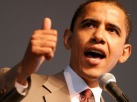
The President still believes that deepwater drilling for oil is essential to our energy security. Announcing a commission to investigate the BP Deepwater Horizon disaster, the President emphasized that "the Gulf of Mexico can play an important part in securing our energy future." The problem, according to the President, is not with oil or deepwater drilling. The problem is the "cozy relationship" that developed "between oil and gas companies and the agencies that regulate them."
His solution, therefore, is to fix the regulations and the regulators. He does not reject those who cheer "Drill Baby Drill." He just wants the oil companies to be more careful when they do the drilling.
This should come as no surprise. During the campaign, he never said that we should reduce our dependence on oil. He always said that we should reduce our dependence on foreign oil. If you did not understand what he meant then, you should understand what he means now. President Obama is in favor of increasing our dependence on domestic oil.
The President's approach to coal has been very similar. He wants us to use more coal, not less. One of his first "environmental" initiatives was to establish a task force to study "ways to increase the use of coal in meeting the nation's energy needs without increasing the pollution that contributes to global warming." Calling coal "one of our most abundant energy resources," the President said that we just need to figure out how to make it cleaner and safer. "If we can develop the technology to capture the carbon pollution released by coal," he said, "it can create jobs and provide energy well into the future."
To be fair, President Obama is a strong supporter of increasing energy efficiency and reducing carbon emissions. He is spending $5 billion from the American Recovery and Reinvestment Act to improve the insulation and windows in low-income housing. He issued an Executive Order requiring federal government agencies to reduce their greenhouse gas emissions by 28% by 2020. He forced out top management of some US car makers and gave them a new direction that includes fuel efficient and electric vehicles. He favors extending fuel efficiency standards to heavy trucks.
The President belongs to a group that considers themselves energy realists. The energy realists point out that renewables make up such a tiny percentage of total energy production today that a doubling, tripling or even quadrupling of renewable energy resources will not have any meaningful impact on our mix of energy sources. The solution, according to the energy realists, will come only with technological breakthroughs. In the meantime, we have to focus on reducing our dependence on "foreign" oil by increasing our energy efficiency and by exploiting "domestic" sources of energy -- including oil and coal.
The problem, of course, is that much of what President Obama is doing could turn out to be temporary. A subsequent administration could easily rescind the Executive Order on federal government greenhouse gas emissions and relax enforcement of any new regulations. The buildings that are being "weatherized" with better insulation and windows today are mostly old, inefficient structures that should and will be torn down one day. The oil and coal companies will continue to face very little competition from alternative energy and will continue to have inordinate influence in both the economy and the political system.
As for the two initiatives with the greatest potential to have long-term effects -- electric cars and carbon capture and sequestration -- many environmentalists have a sense of deja vu all over again. They remember the oil embargo in the 1970's, when an initial push for smaller, fuel-efficient cars was followed by the invention of gas-guzzling SUVs. And they fear that government-funded research into carbon capture and sequestration may go the way of President Carter's government-funded synfuels corporation.
These environmentalists are looking for a Green Revolution with game-changing policies and a permanent restructuring of energy economics. Instead of government subsidies and tax breaks for oil and coal, the Green Revolutionaries want to shift those subsidies to renewable energy, and then raise the price of oil and coal to account for the cost of pollution. The ultimate objective of this revolution is not just to reduce our dependence on foreign oil, but to reduce and ultimately eliminate our use of oil, coal, and other fossil fuels whatever the source.
Whether or not those are realistic objectives is open for debate. But one thing is certain. President Obama is not going to lead that revolution. He has a much higher tolerance for a little gray with his green.
John Howley
Orlando, Florida
 RSS Feed
RSS Feed